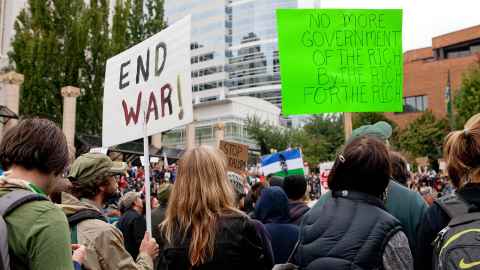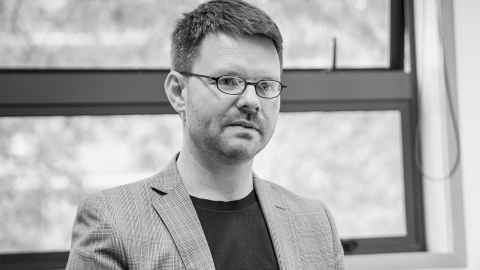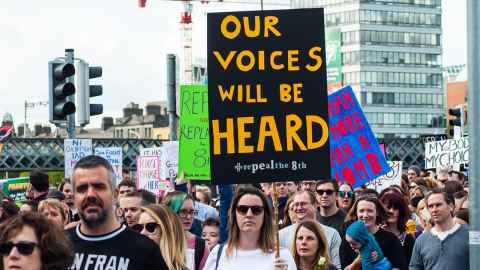Reshaping democracy: letting the people make decisions
31 October 2022
More people live in autocratic regimes than in liberal democracies. Associate Professor of philosophy Matheson Russell talks to Gilbert Wong about the ways in which everyday citizens can have a stake in the future.

When it comes to the state and future of democracy, the think tanks, global policy experts and journalists are pessimistic.
“The world is becoming more authoritarian as autocratic regimes become even more brazen in their repression,” was the pronouncement of the Stockholm-based International Institute for Democracy and Electoral Assistance in its Global State of Democracy report for 2021.
The Economist has taken a snapshot of the state of democracy worldwide since 2006. Its 2021 report, The China Challenge, found that less than half the world’s population lives in a democracy of some sort and just 8.4 percent in what it regards as a ‘full democracy’.
Of 167 countries The Economist looked at, 75 could be considered partly democratic, but 57 as authoritarian regimes. The report produces a Democracy Index to distil its research. In 2021, it was 5.37 out of a possible 10 and has been declining since the global financial crisis of 2008. New Zealand ranks well, second after Norway and ahead of other Nordic states that regularly populate the top five.
The Pew Research Centre asked people in 17 advanced economies what worried them about their democratic political system. More than half, 56 percent, said their political system needed major change or total reform. But of those polled in eight of the countries, about half said they had little or no confidence their system could effectively be changed.

“When the Berlin Wall fell in 1989, we were told it signalled ‘the end of history’,” says Matheson Russell, an associate professor of philosophy.
“The Cold War was over, the communist cause defeated. Liberal democracy had won the day.”
Thirty years later, that optimism has been dispelled. He says democracy faces enormous challenges. From climate change to economic inequality, from the splintering of mass media to the rise of disinformation and extremism. The voter turnout in major democracies keeps falling, matched by polls recording low satisfaction with governments. It has not taken long, he says, for ‘the end of history’ and the triumph of liberal democracies to become a ‘democratic recession’, a phrase coined by political scientists.
Matheson offers a counterpoint to the gloomy narrative.
“Under our noses, democracy is being reimagined and redesigned around the edges of existing democratic institutions.”
He says citizen-led decision-making processes are being experimented with to counter the loss of engagement by ordinary people in decision-making. They are based on sortition, an ancient practice from the cradle of democracy when Athens was a city state from 600 BC.
“Sortition or lottery was a central feature of ancient Athenian democracy,” he says.
“Citizens could participate in the business of politics. In particular, the ecclesia, or plenary assembly, was open to all citizens.”
Under our noses, democracy is being reimagined and redesigned around the edges of existing democratic institutions.

But the ecclesia was not a law-making body. Its role was limited to debate on certain pre-determined issues. Most of the business of political decision-making took place in other bodies, including the Boule, the 500-member governing council, which set the agenda for assembly meetings; the Nomothetai – the legislative body; and the Dikasteria – the courts – each of which involved hundreds of citizens.
Citizens weren’t elected to these bodies. Each year, about 6,000 citizens were randomly selected. From these, individuals were chosen by lot to become members for a term.
“The lottery system meant citizens would rotate through political offices over the course of their lives.”
Renaissance Italian city-states like Florence also used lotteries in some parts of their political systems, making random appointments to law-making and other bodies. The Florentines saw the lotteries as an essential tool to prevent factions from manipulating the political process.
In 2016, the Irish government trialled sortition. Ninety-nine randomly selected citizens, a cross-section of society, considered the contentious issue of abortion law reform. Over several months, this Citizens’ Assembly interviewed experts, weighed up medical, moral and legal considerations, deliberated, drafted and voted on a set of recommendations. Politicians who observed the assembly’s deliberations were impressed by the rigour of the process and the quality of the recommendations.
In 2018, Irish abortion laws were liberalised through a referendum and an amendment to the Irish Constitution.
“The Irish public were able to see people like themselves conscientiously working through a matter of complexity and gravity," says Matheson. "Ultimately, the work of the Citizens’ Assembly was instrumental in moving Ireland forward on a politically deadlocked issue.”
Referenda are sometimes touted to give citizens a say in contentious political decisions in New Zealand but a common issue is a knowledge gap. How can voters reach an informed view on what is often a difficult moral and ethical choice?
When the Berlin Wall fell in 1989, we were told it signalled ‘the end of history’.
A successful model is operating well as a standard part of the process in Oregon, US.
Before a referendum, between 18 and 24 citizens, randomly selected to be representative of the population, are asked to consider the ballot initiative in depth. They meet for three to five days to learn about it and deliberate. As part of the process, they interview proponents and opponents of the ballot proposal.
Their research is summed up in a citizens’ statement, sent to all voters with the ballot papers. The statement is a one-pager explaining what the ballot initiative is and summarising the main arguments’ pros and cons. The statement also reports on how the Citizens’ Review panel intends to vote. This has been a permanent part of the process in Oregon legislature since 2011.
Iceland faced political turmoil following the global financial crisis. Following public pressure, the parliament agreed that the Constitution of Iceland should be completely rewritten. A coalition of activists, scholars and community leaders came up with a novel process including a National Assembly of 1,500 randomly selected Icelanders. The Assembly used crowd-sourcing as a way for the wider public to contribute ideas for a new constitution.
The next stage saw 950 randomly selected Icelanders appointed to a national forum, facilitated by Anthill, a coalition of academics, politicians and community leaders representing civil society. From there, Iceland held an election for 25 citizens to form an assembly to draft the new constitution, encompassing the work of the previous bodies.
The reshaping of the Icelandic Constitution combined sortition, election, crowd-sourcing, digital participation and referenda. The result is the most inclusive constitution in history. It included radically new ideas, such as the nationalisation of previously unowned natural resources, the right to access the internet and the right of citizens to initiate referenda on laws.
“The entire process met with opposition by the political establishment. They resisted putting the draft constitution to a referendum. When it did go to a referendum in 2012, it was supported by two-thirds of Icelanders,” says Matheson.
“But the political establishment was ultimately successful in preventing the new constitution being passed into law. Despite that, the Iceland experiment shows how narrow our imagination of democracy is.”
Yale political scientist Hélène Landemore observed the Icelandic constitutional drafting process in person. In her book Open Democracy, she writes: “[It] emboldened me to conclude that the limits of our current systems, as well as the changes brought about by globalisation and the digital revolution, call for a radically different approach to the question of the best regime ... one that interrogates the very institutional principles of democracy as we practise it today.”
Matheson says these examples offer lessons for the evolution of liberal democracies.
“Randomly selecting people to make important decisions might seem a bit crazy, but what we have learnt from experience is fascinating. Ordinary people are perfectly competent to make complex decisions if they are given the opportunity, the context and resources to do it.”
This story is from the University of Auckland's alumni and friends publication Ingenio, Spring 2022 issue.
It is an edited version of a longer article 'Can we fix democracy' that appeared in Mātātaki: The Challenge, a repository of stories about University of Auckland researchers tackling national and global issues, at auckland.ac.nz/the-challenge